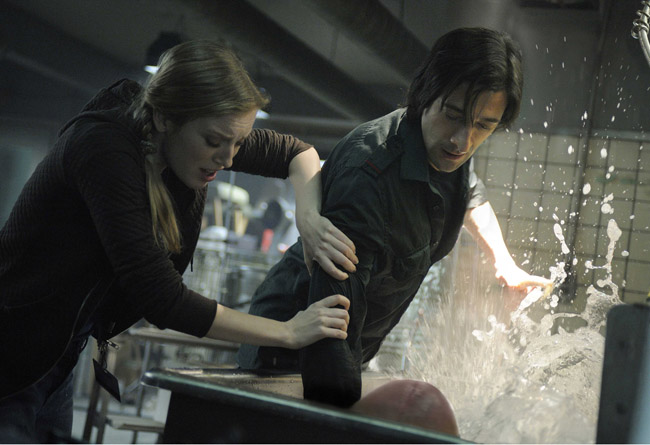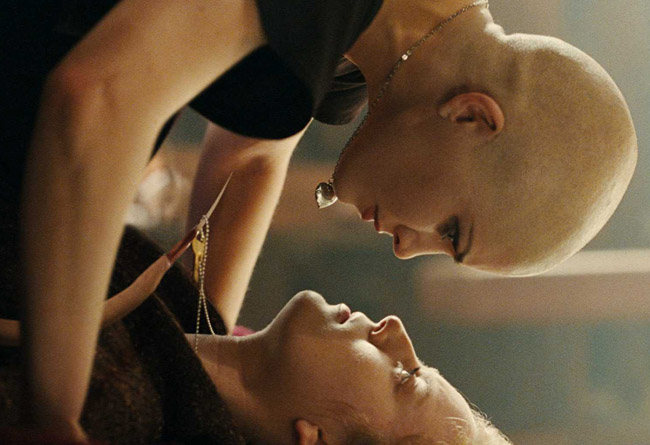CHICAGO – In anticipation of the scariest week of the year, HollywoodChicago.com launches its 2024 Movie Gifts series, which will suggest DVDs and collections for holiday giving.
Adrien Brody, Sarah Polley Are Scientists Creating a ‘Splice’ of Life
 Rating: 3.5/5.0 |
CHICAGO – The science of existence gets trickier everyday, and it doesn’t help when humans start creating their own competition. The new film “Splice,” featuring Adrien Brody and Sarah Polley, explores the current trend of genetic research, while at the same time paging Dr. Frankenstein.
Adrian Brody is Clive and Sarah Polley is Elsa. They are hot scientists-as-rock-stars, having developed several new animal disease cures through their genetic splicing of different species. The results of the gene weaving are more protoplasmic than discernible animal, but the research yields a big cash outlay from a mega-pharmaceutical corporation, hoping to isolate protein strains that can translate to new drugs.
Elsa becomes restless with the random animal experiments and hopes to expand to the next frontier – the splicing of human genetic material with other species. Unknown to Clive, she uses the lab facilities to begin the process, using her own DNA material in the mixer. The manipulations are successful, and Clive discovers the secret experiment just as the new life comes into the world.
The “creature” that results from the lab is a mixture of the splice gene pool. Named Dren (nerd spelled backwards, ha), the sex is a girl, but the body characteristics are a combination of animal parts, including legs that are bird-like and a tail. Dren (portrayed by French actress Delphine Chanéac) also has accelerated growth, so Clive and Elsa hide her on a remote farm, and attempt to resume their normal activities.
 Photo credit: Steve Wilkie for © Warner Bros. Pictures |
As the Frankenstein-type myth unfolds, the creators don’t know the implications of what they’ve created. Dren develops too rapidly and begins to desire sexual reproduction, as well as developing a combination of strengths that could push back against the very humanity that propagated her.
This is monster-movie-as-ripped-from-the-headlines, as modern genome research meets its latest creation. All the test tubes and machines are in place, with Brody and Polley following through on the character of the scientist that goes too far, believing that they can control the creation that comes from their own hubris, the aberration in the manipulation of evolutionary nature.
The whole film has a creep factor, much like a Twilight Zone vibe, intentionally designed and put into place by writer and director Vincenzo Natali. Dren is freakish, but appealingly so, which makes her uncomfortably disturbing. Although there is a screenplay inconsistency involving her mental acuity, Dren does learns to love, which puts her in a moral position above the human factor that realize she can no longer exist.
Big Business is given a role in the process, as their quest for the bottom line morphs into the necessities that results in Dren. There is a chilling scene where the early protoplasms that Clive and Elsa had spliced attack each other during a stockholders presentation, spilling blood onto the moneymakers. Like oil in the water, nature has a way of dealing with manmade power.
 Photo credit: © Warner Bros. Pictures |
The beginning of the film is a bit choppy, as the narrative flits between the creation of Dren and establishing the characters of Clive and Elsa, who seem very unscientific in personality. Brody and Polley give it their best shots, but some ridiculous dialogue and high concept situations conspire against them. Sarah Polley is a wonderful under-the-radar cult actress who carefully picks the image and mystery of her movie roles, but she is given too much sensibility to communicate here and there is nothing exceptional about this performance.
The film overall is good though, because the science is probable and Dren is so unsettling and bizarre that we can’t help but root for her. She is a person, place and thing all at the same time, and in an existential sense that is all of us. Does coming out of a lab experiment rather than a womb quench a desire for acceptance any less acutely? Splice answers the question by presenting the next step in evolution, for our approval.
 | By PATRICK McDONALD |


